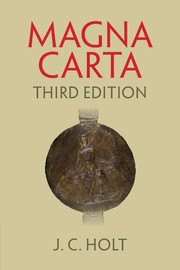Book contents
- Frontmatter
- Dedication
- Contents
- List of plates
- Preface to third edition
- Preface to second edition
- Preface to first edition
- Acknowledgements
- Abbreviations
- Introduction
- 1 The Charter and its history
- 2 Government and society in the twelfth century
- 3 Privilege and liberties
- 4 Custom and law
- 5 Justice and jurisdiction
- 6 Crisis and civil war
- 7 Quasi Pax
- 8 The quality of the Great Charter
- 9 The achievement of 1215
- 10 From distraint to war
- 11 The re-issues and the beginning of the myth
- Appendices
- References
- Index
- Plate section
10 - From distraint to war
Published online by Cambridge University Press: 05 July 2015
- Frontmatter
- Dedication
- Contents
- List of plates
- Preface to third edition
- Preface to second edition
- Preface to first edition
- Acknowledgements
- Abbreviations
- Introduction
- 1 The Charter and its history
- 2 Government and society in the twelfth century
- 3 Privilege and liberties
- 4 Custom and law
- 5 Justice and jurisdiction
- 6 Crisis and civil war
- 7 Quasi Pax
- 8 The quality of the Great Charter
- 9 The achievement of 1215
- 10 From distraint to war
- 11 The re-issues and the beginning of the myth
- Appendices
- References
- Index
- Plate section
Summary
The optimism with which the Great Charter and the writs of 19 June referred to the newly agreed peace was soon put in question. By the middle of September the country was at war, and at war about the Charter. This was not a sudden or an accidental climax; it was the result of a lengthy development which can be traced back through the summer months to Runnymede itself. The Charter was made possible by its imprecisions and inexactness; these same qualities now meant that its application in practice was bound to become a matter of increasingly bitter debate and, in the end, open dispute. This was most obvious in those sections concerned with the restoration of rights arising from disseisin by the Crown or the exaction of unjust fines, and in the provisions of cap. 61 for the enforcement of these arrangements through judgement of the Twenty-Five barons. These clauses echoed with unanswered questions. What was an unjust disseisin or an unjust fine? What was understood by the words ‘without lawful judgement’ or ‘contrary to the law of the land’ in such cases? If the king had failed to meet all the demands against him by 15 August, the terms set in the treaty about London, what was to happen then? How long thereafter were the barons to continue to hold London? If the king failed to accept the judgement of the Twenty-Five and they proceeded to distrain and molest him as the Charter laid down, what was to happen if the king refused to be brought to heel? The baronial answers to these questions seemed deceptively simple. Unjust disseisins and fines were to be defined by the Twenty-Five; if outstanding issues had not been settled by 15 August then they were to continue to hold London; if the king refused to accept the arbitration of the Twenty-Five then he was to be distrained until he did.Hence they simply tried to enforce the letter of the Charter. They did not defy the king, as they had done in the spring.
- Type
- Chapter
- Information
- Magna Carta , pp. 291 - 313Publisher: Cambridge University PressPrint publication year: 2015



